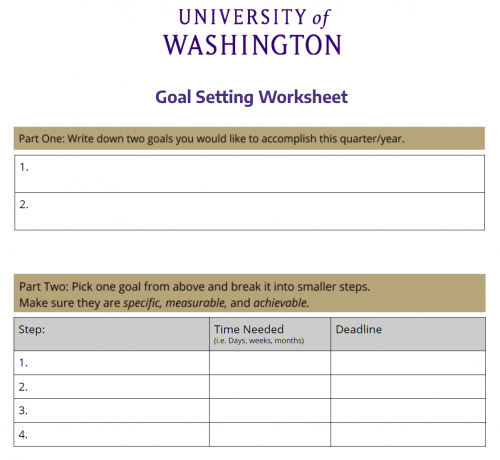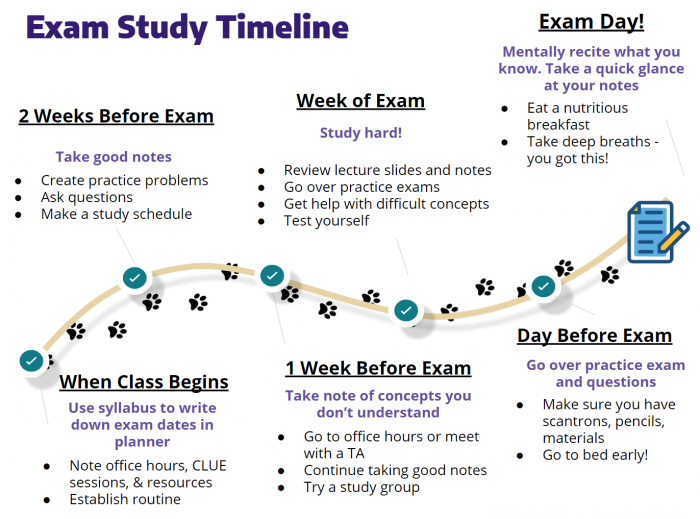Studying
In addition to time management, effective study skills are an essential part of mastering class content and helping you succeed academically.
To master your study skills in college, you must come up with your own study schedule and stick to it. This can be challenging at first, especially when many new social opportunities and responsibilities have also been added to your life; however, if you invest some initial time analyzing your activities and setting up a personal study schedule, you will find it easier to succeed in your studies and have time for a social life too.
Analyze Your Time
- Note how you currently spend your time on schoolwork. Use the weekly time commitment worksheet to block out the time you spend in class, at work, practicing, tending to family commitments, etc.
- Decide how you want to use your time in the future. What do you want to improve on — is it note-taking style, finding main ideas, or test-taking most broadly?
 Try this: Find a friend or peer who's really good at a study strategy you want to develop, and talk to them about how they worked on this habit. Are there ways that you can study together to stay accountable?
Try this: Find a friend or peer who's really good at a study strategy you want to develop, and talk to them about how they worked on this habit. Are there ways that you can study together to stay accountable?
Establish a Routine
- Start by setting a specific study time and place for each course. There are some locations you can study on campus, such as the HUB, however, it is important to adequately set up your at-home work space and separate it from your relaxation or resting spaces.
- Try to study at times when you are most alert and free from other distractions.
Set Goals
You can use this worksheet to start identifying your goals for the academic quarter and year.

Make the goals for your study sessions 1) specific, 2) measurable, 3) actionable 4) relevant and 5) timely. These are called smart goals and will make it easier for you to hold yourself accountable.
 Try this: At the beginning of every quarter, reflect on the questions, "What do I want to achieve this school year? What are my measures of success?" Write down your responses and share them with peers, friends, or roommates to hold yourself accountable! Use this Beginning of Quarter worksheet to help identify your goals.
Try this: At the beginning of every quarter, reflect on the questions, "What do I want to achieve this school year? What are my measures of success?" Write down your responses and share them with peers, friends, or roommates to hold yourself accountable! Use this Beginning of Quarter worksheet to help identify your goals.
Reward yourself with a fun activity like visiting the IMA, attending an event on campus, getting bubble tea on the ave, or catching up with a friend!
Now that you've set up some specific goals, here are some tips for daily maintenance of your study skills!
Keep up with each day's classes
- If possible, look over your instructor's notes or Powerpoints prior to lecture - some professors will make these notes available on the course website in advance, and you can even print them and take notes in class. That way, your instructor's explanations in class will reiterate the content you've seen before, which can help you ask more specific clarifying questions!
- Remember questions the instructor asked during class, and draft up responses on your own or with other classmates
- Read the subheadings in the textbook and any discussion questions at the end of each chapter.
 Try this: Write down questions you have during lecture and try to solve them on your own later in the day. If you are unable to solve them, take those questions to your instructor's office hours or send them an email!
Try this: Write down questions you have during lecture and try to solve them on your own later in the day. If you are unable to solve them, take those questions to your instructor's office hours or send them an email!
Organize your study sessions
- Create a schedule of one to three hours of study for each hour in class using this worksheet.
- Work on your most difficult subjects first.
- Schedule tasks based on due dates. This can be make it easier to identify potentially conflicting deadlines and create a plan to tackle them all in a timely manner.
- Use this 7-day Study Plan to help mix up study strategies throughout your week.
- Visualize large projects as a series of small steps, and make smaller due dates along the way.
- Alternate activities (reading, writing, brainstorming) to keep it engaging!
- Don't schedule more than three hours of study without making time for a more substantial break.
 Try this: Study for one hour, then take a 10-minute break. It's important to give yourself mental breaks while studying so you don't burn out!
Try this: Study for one hour, then take a 10-minute break. It's important to give yourself mental breaks while studying so you don't burn out!

Studying on the Run
- Write the main points of a lecture or chapter on flashcards that you can use during passing periods or while waiting for class to start
- Keep your notes handy so you can study on the bus or on the way to class
- Record lectures on your phone and listen to them on the way to class, while you're jogging, etc.
Form a study group
That's the simple idea behind study groups. By participating in a study group, you take advantage of one of your best academic resources at UW: other students. You can discuss your approaches to the same problems and develop study strategies that work for everyone! Study groups also bring a social quality to your study time.
"Group study encourages you to explain things out loud which increases confidence and comprehension of the material" (Simon Fraser University, 2016).
Guidelines for a Successful Study Group
- Keep it small, but not too small so you can hold everyone accountable and find a time that works. 4-5 participants is about right.
- Try to create a study group with people of equal ability.
- Clarify your goals. Are you coming together to prepare for a particular test? To discuss reading? To review homework?
- Agree on a meeting schedule when you create your group. Will you meet once a week or once a month?
- Try to find a regular time and place to meet that's convenient for everyone, and try to mindful of people's work, commuting, and class schedule!
- Make room for fun, but make sure it takes up only a small portion of your group study time.
Roles Within a Group
Some groups like to assign members certain roles to keep the group functioning smoothly. You might like to try:
- Organizer: This person gets group members to agree to a common purpose and a convenient time and place.
- Expediter: This person watches the time to make sure group doesn't spend too long on one thing. The Expediter will also try to keep the group focused on the task at hand, for example by directing a social conversation back to study questions.
- Source-seeker: This person reminds group members to cite their sources. When a group member says "I read somewhere that...," the Source-seeker remembers to ask for specifics. They remind the group that it's important to know who said what, and where it was said.
- Facilitator: This person tries to make sure that all group members are participating. The Facilitator might ask a direct question to help a shy person participate or pose open-ended questions to the whole group.
- Harmonizer: This person resolves potential conflicts and reminds everyone of the expectations that have been decided on by the group.
 Try this: Do your homework problems individually before study group. Then have group members teach each other how they solved the problems. Concentrate on the reasoning process, how you thought your way through the problem.
Try this: Do your homework problems individually before study group. Then have group members teach each other how they solved the problems. Concentrate on the reasoning process, how you thought your way through the problem.
Some Uses of Study Groups
- Review the week's lecture notes. Agree on what points were most important and fill in missing information - you can even do this on a Google Doc that everyoen edits at once!
- Discuss class readings. Clarify difficult passages. Practice explaining difficult concepts to each other. Correlate with lecture material. Create reading questions for upcoming assignments.
- Study for tests by predicting test questions. Have members contribute sample exam questions and evaluate which questions are most likely to appear on the test. Look at important topics and make up different kinds of test questions (objective, application, evaluation) for each topic.
- For an essay exam, practice outlining essay answers to your questions. (Note: if you're working on a paper or preparing for an exam where the prof gave out exam questions in advance, don't create a group outline, as it can lead to plagiarism.)
- In a writing course, come together to critique each other's rough drafts. Before you begin, have each writer identify a few areas of improvement or focus for the person reading their assignment.
As you work in a study group, remember to utilize other campus resources in combination to your group work. Visit professor and TA office hours, study centers, the Odegaard Writing Center, and CLUE just to name a few!
Try this: Find a friend or peer who's really good at a study strategy you want to develop, and talk to them about how they worked on this habit. Are there ways that you can study together to stay accountable?

Try this: At the beginning of every quarter, reflect on the questions, "What do I want to achieve this school year? What are my measures of success?" Write down your responses and share them with peers, friends, or roommates to hold yourself accountable! Use this Beginning of Quarter worksheet to help identify your goals.
Try this: Write down questions you have during lecture and try to solve them on your own later in the day. If you are unable to solve them, take those questions to your instructor's office hours or send them an email!
Try this: Study for one hour, then take a 10-minute break. It's important to give yourself mental breaks while studying so you don't burn out!

Try this: Do your homework problems individually before study group. Then have group members teach each other how they solved the problems. Concentrate on the reasoning process, how you thought your way through the problem.